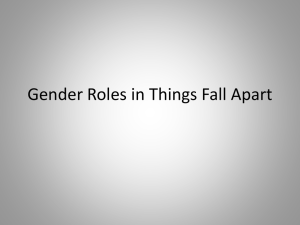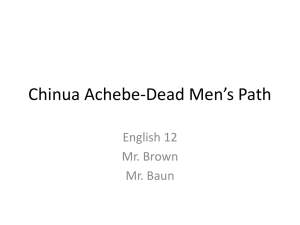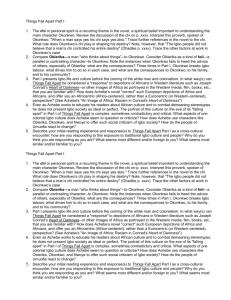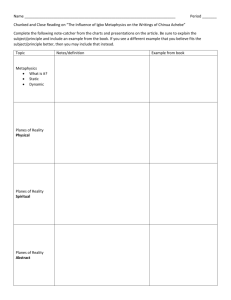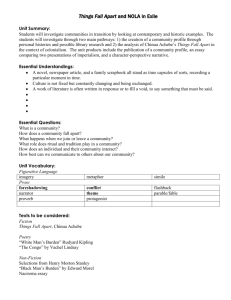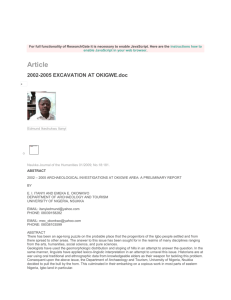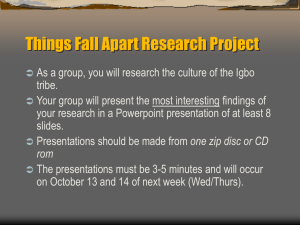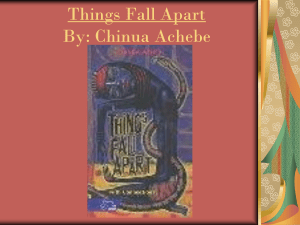THINGS FALL APART SIGNIFICANT POINTS Chapters 21
advertisement
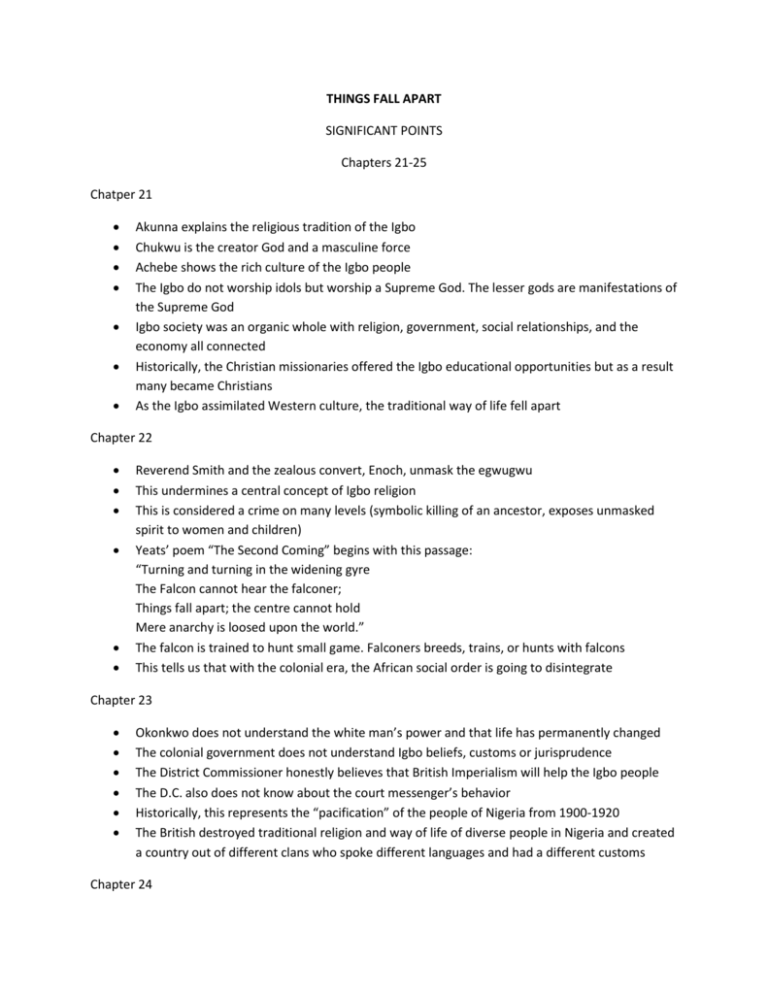
THINGS FALL APART SIGNIFICANT POINTS Chapters 21-25 Chatper 21 Akunna explains the religious tradition of the Igbo Chukwu is the creator God and a masculine force Achebe shows the rich culture of the Igbo people The Igbo do not worship idols but worship a Supreme God. The lesser gods are manifestations of the Supreme God Igbo society was an organic whole with religion, government, social relationships, and the economy all connected Historically, the Christian missionaries offered the Igbo educational opportunities but as a result many became Christians As the Igbo assimilated Western culture, the traditional way of life fell apart Chapter 22 Reverend Smith and the zealous convert, Enoch, unmask the egwugwu This undermines a central concept of Igbo religion This is considered a crime on many levels (symbolic killing of an ancestor, exposes unmasked spirit to women and children) Yeats’ poem “The Second Coming” begins with this passage: “Turning and turning in the widening gyre The Falcon cannot hear the falconer; Things fall apart; the centre cannot hold Mere anarchy is loosed upon the world.” The falcon is trained to hunt small game. Falconers breeds, trains, or hunts with falcons This tells us that with the colonial era, the African social order is going to disintegrate Chapter 23 Okonkwo does not understand the white man’s power and that life has permanently changed The colonial government does not understand Igbo beliefs, customs or jurisprudence The District Commissioner honestly believes that British Imperialism will help the Igbo people The D.C. also does not know about the court messenger’s behavior Historically, this represents the “pacification” of the people of Nigeria from 1900-1920 The British destroyed traditional religion and way of life of diverse people in Nigeria and created a country out of different clans who spoke different languages and had a different customs Chapter 24 Okonkwo chooses violence over words at the meeting Okonkwo appears impetuous, violent and angry He is paradoxically afraid of failure and doomed to failure in spite of personal achievements Okonkwo commits murder to reclaim traditional power and authority usurped by the white man The clan, however, does not understand and does not act with solidarity Okonkwo recognizes that the clan has failed to resist oppression and respond to the rapid changes introduced by the British And yet, Okonkwo has not always respected Igbo beliefs (he denies the feminine elements of a balanced Igbo life, he violates the Week of Peace, he takes a shot at his wife, participates in the ritual murder of Ikemenufu, and accidentally kills Ezeudu’s son) Also, the clan itself breaks their own values (throws twins in the forest, ostracizes mothers, enslaves the osu, and discriminates against unsuccessful men) Christianity, however, changes things: twins are rescued, abject mothers, the osu and weak men are given dignity and new life) Paradoxically, as Christianity brings new life and a voice to the disenfranchised, it also destroys traditional life, divides the clan, and introduces a violent colonial government Okonkwo only relates to the masculine elements of Igbo life. He defends the Igbo concepts of communalism, equal opportunity, strong kinship relationships, and the traditional religion However, Okonkwo does not question the injustices of traditional life such as the Igbos’ treatment of twins, discrimination against the osu and the marginalization of the weak and abnormal Okonkwo may represent the fundamental Igbo attitude of individualism and independence He may be a microcosm for the traditional Igbo worldview Chapter 25 Okonkwo is a paradox. He represents traditional Igbo life yet his self-destruction contradicts everything the Igbo society represents Is he a tragic hero because his individualism results in disaster when he stands for his convictions His suicide saves him imprisonment, cheats the whites of revenge, and makes a mockery of the values of the clan Is Okonkwo mad? What does he really stand for and what is the significance of his destruction/death? Does Okonkwo represent the suicidal fragmentation of Igbo society? His life is ruled by fear of failure and yet he fails He is unable to understand his father or son He is unable to balance the male and female energies in the traditional world order He is unable to adapt to the changes introduced by the white colonizer His suicide is shocking and ambiguous Ironically, his death is as shameful as his father’s Obierika addresses the District Commissioner, “That man was one of the greatest men in Umuofia. You drove him to kill himself; and now, he will be buried like a dog…” Is this an indictment against Christianity? How has Christianity destroyed what held Igbo society together? Newton Stallknecht states, “Achebe describes, often with shrewd anthropological insight, the moral disintegration of an ancestral order and of an heroic leader brought into collision with European powers and ideas.” Achebe does not idealize or romanticize the past or Igbo life but he does show that Europe did not introduce civilization to savages
